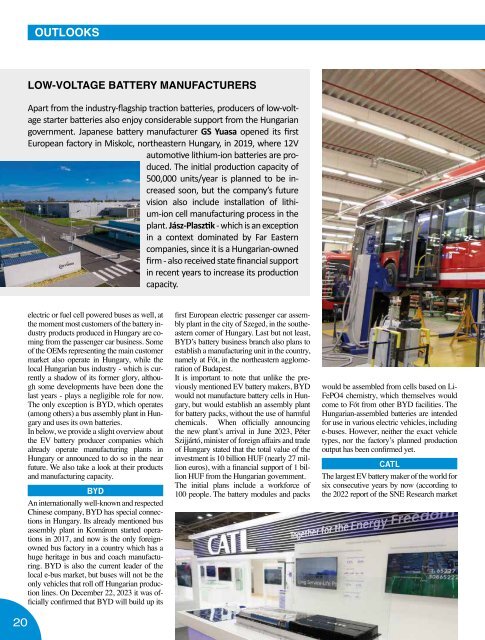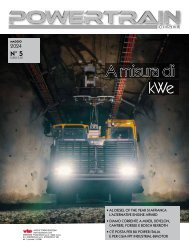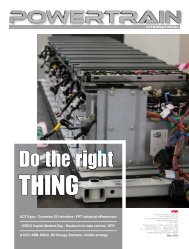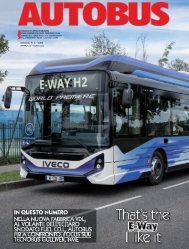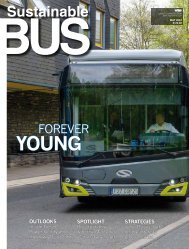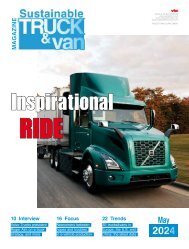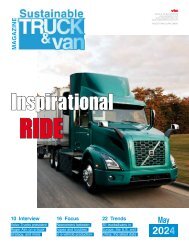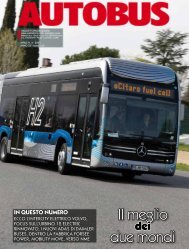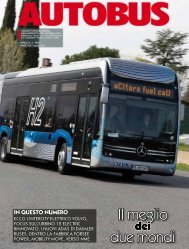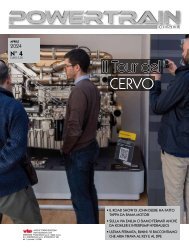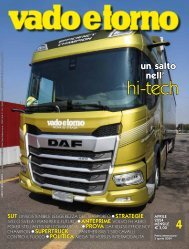2024-02 SUSTAINABLE BUS
In this issue, all the figures on the European e-bus market 2023 (hint: over 40 of the new city buses were electric!), a reporting on #battery manufacturing plans underway in Hungary and their impact on the European #electricbus landscape, a focus on powertrain values and strategies in the realm of e-mobility. Plus, a piece on the challenges faced by #BEV bus adoption in Germany (yes, it's also a matter of TCO).
In this issue, all the figures on the European e-bus market 2023 (hint: over 40 of the new city buses were electric!), a reporting on #battery manufacturing plans underway in Hungary and their impact on the European #electricbus landscape, a focus on powertrain values and strategies in the realm of e-mobility.
Plus, a piece on the challenges faced by #BEV bus adoption in Germany (yes, it's also a matter of TCO).
You also want an ePaper? Increase the reach of your titles
YUMPU automatically turns print PDFs into web optimized ePapers that Google loves.
OUTLOOKS<br />
LOW-VOLTAGE BATTERY MANUFACTURERS<br />
Apart from the industry-flagship traction batteries, producers of low-voltage<br />
starter batteries also enjoy considerable support from the Hungarian<br />
government. Japanese battery manufacturer GS Yuasa opened its first<br />
European factory in Miskolc, northeastern Hungary, in 2019, where 12V<br />
automotive lithium-ion batteries are produced.<br />
The initial production capacity of<br />
500,000 units/year is planned to be increased<br />
soon, but the company’s future<br />
vision also include installation of lithium-ion<br />
cell manufacturing process in the<br />
plant. Jász-Plasztik - which is an exception<br />
in a context dominated by Far Eastern<br />
companies, since it is a Hungarian-owned<br />
firm - also received state financial support<br />
in recent years to increase its production<br />
capacity.<br />
electric or fuel cell powered buses as well, at<br />
the moment most customers of the battery industry<br />
products produced in Hungary are coming<br />
from the passenger car business. Some<br />
of the OEMs representing the main customer<br />
market also operate in Hungary, while the<br />
local Hungarian bus industry - which is currently<br />
a shadow of its former glory, although<br />
some developments have been done the<br />
last years - plays a negligible role for now.<br />
The only exception is BYD, which operates<br />
(among others) a bus assembly plant in Hungary<br />
and uses its own batteries.<br />
In below, we provide a slight overview about<br />
the EV battery producer companies which<br />
already operate manufacturing plants in<br />
Hungary or announced to do so in the near<br />
future. We also take a look at their products<br />
and manufacturing capacity.<br />
BYD<br />
An internationally well-known and respected<br />
Chinese company, BYD has special connections<br />
in Hungary. Its already mentioned bus<br />
assembly plant in Komárom started operations<br />
in 2017, and now is the only foreignowned<br />
bus factory in a country which has a<br />
huge heritage in bus and coach manufacturing.<br />
BYD is also the current leader of the<br />
local e-bus market, but buses will not be the<br />
only vehicles that roll off Hungarian production<br />
lines. On December 22, 2<strong>02</strong>3 it was officially<br />
confirmed that BYD will build up its<br />
first European electric passenger car assembly<br />
plant in the city of Szeged, in the southeastern<br />
corner of Hungary. Last but not least,<br />
BYD’s battery business branch also plans to<br />
establish a manufacturing unit in the country,<br />
namely at Fót, in the northeastern agglomeration<br />
of Budapest.<br />
It is important to note that unlike the previously<br />
mentioned EV battery makers, BYD<br />
would not manufacture battery cells in Hungary,<br />
but would establish an assembly plant<br />
for battery packs, without the use of harmful<br />
chemicals. When officially announcing<br />
the new plant’s arrival in June 2<strong>02</strong>3, Péter<br />
Szijjártó, minister of foreign affairs and trade<br />
of Hungary stated that the total value of the<br />
investment is 10 billion HUF (nearly 27 million<br />
euros), with a financial support of 1 billion<br />
HUF from the Hungarian government.<br />
The initial plans include a workforce of<br />
100 people. The battery modules and packs<br />
would be assembled from cells based on Li-<br />
FePO4 chemistry, which themselves would<br />
come to Fót from other BYD facilities. The<br />
Hungarian-assembled batteries are intended<br />
for use in various electric vehicles, including<br />
e-buses. However, neither the exact vehicle<br />
types, nor the factory’s planned production<br />
output has been confirmed yet.<br />
CATL<br />
The largest EV battery maker of the world for<br />
six consecutive years by now (according to<br />
the 2<strong>02</strong>2 report of the SNE Research market<br />
SK Innovation<br />
Another major player from South Korea,<br />
battery industry giant SK Innovation operesearch<br />
and consultant company from South<br />
Korea), CATL is a well known supplier of<br />
many electric cars and buses worldwide. The<br />
Chinese industry giant is also considered to<br />
be one of the most important company in the<br />
Hungarian economy in the future. Although<br />
not operating yet, it is already decided and<br />
officially announced that CATL will establish<br />
a huge battery cell manufacturing plant<br />
in Debrecen, the second most populous city<br />
of Hungary. This will be the second battery<br />
manufacturing base of the company outside<br />
China, after commissioning the first such<br />
unit in Erfurt, Thuringia, Germany.<br />
The project, which is the biggest greenfield<br />
investment to date in Hungary with its total<br />
value of 7.34 billion euros, enjoys great support<br />
from the Hungarian government, in order<br />
to create an estimated 9,000 jobs locally.<br />
According to the available industry news,<br />
CATL’s Debrecen plant will produce NMC<br />
cells in prismatic and cylindrical format. Production<br />
output in the first phase will be an<br />
impressive 40 GWh/year, with plans already<br />
announced to increase it to even 100 GWh/<br />
BYD plant is the only<br />
foreign-owned bus factory<br />
in Hungary. The group<br />
has plans to establish an<br />
assembly facility for battery<br />
packs. CATL will establish a<br />
battery cell manufacturing<br />
plant in Debrecen, the<br />
second most populous city<br />
of Hungary. This will be the<br />
2nd battery manufacturing<br />
base of the company<br />
outside China, after the one<br />
in Erfurt, Germany.<br />
year in the near future. Trial production is<br />
planned to start at the beginning of 2<strong>02</strong>5.<br />
Modules and cells produced at the Debrecen<br />
factory will appear in electric models of approximately<br />
30 different car manufacturers,<br />
including BMW, Daimler, Volkswagen, Toyota,<br />
Volvo and Tesla. CATL traction batteries<br />
are also widely used by e-bus manufacturers,<br />
among others the world’s largest<br />
bus and coach manufacturer Yutong and the<br />
Hungarian brand Ikarus.<br />
EVE Power<br />
In May 2<strong>02</strong>3, another major battery industry<br />
investment was officially announced on the<br />
Hungarian media: EVE Power, another powerful<br />
Chinese participant of the EV battery<br />
industry, will establish its first European production<br />
plant in Debrecen. It will supply 6thgeneration<br />
cylindrical lithium-ion battery<br />
cells, most probably in a 4695 format, for the<br />
future BMW battery module assembly plant<br />
located also in the same city, with a massive<br />
production capacity of 28 GWh/year. The total<br />
value of the investment exceeds 1 billion<br />
euros (from which 37.5 million euros come<br />
from the Hungarian government as financial<br />
support). The factory is expected to start operating<br />
in 2<strong>02</strong>6, with a workforce of more than<br />
1000 people.<br />
Samsung SDI<br />
Samsung SDI, one of the leading EV battery<br />
cell producers worldwide, can be considered<br />
as a pioneer of the traction battery industry<br />
in Hungary, as it started to construct its first<br />
traction battery plant in the country as early<br />
as 2016, located at Göd (sometimes written<br />
as „Goed” in the international media), a town<br />
about 25 kilometers north of Budapest. In<br />
fact, it was a brownfield investment by converting<br />
Samsung’s own former cathode ray<br />
tube factory, which was closed two years before,<br />
due to the market loss of the technology.<br />
The new battery plant’s inauguration ceremony<br />
was held in 2017, quickly followed by<br />
a further expansion investment of 1.2 billion<br />
euros in the same year. As a result, the second<br />
unit was completed in 2019 and reached full<br />
production capacity (more than 6 million<br />
cells/month) by January 2<strong>02</strong>2. By now the<br />
total manufacturing output increased to 40<br />
GWh/year. Prismatic battery cells produced<br />
here are are used in electric cars of BMW,<br />
Volkswagen and Stellantis. The Hungarian<br />
plant will also supply sixth-generation P6<br />
prismatic NCA cells for Hyundai Motor’s<br />
electric vehicles dedicated for the European<br />
market, starting from 2<strong>02</strong>6.<br />
In January 2<strong>02</strong>3, there were reports that<br />
Samsung SDI would expand its operations in<br />
Hungary with a new production plant, with<br />
a similar output as the previous two. According<br />
to the rumours, this facility would produce<br />
46120-type cylindrical cells, to be used<br />
exclusively in BMW cars - more precisely,<br />
the planned new manufacturing unit is expected<br />
to supply the also recently-announced<br />
BMW battery module assembly plant in Debrecen,<br />
Hungary.<br />
From an e-bus perspective, Samsung SDI<br />
cells are used in the traction battery packs of<br />
Akasol, which itself is a supplier of Mercedes-Benz,<br />
Van Hool and Industria Italiana<br />
Autobus. The current Hungarian market leader<br />
Credobus will also use these packs in<br />
its all-new zero emission bus family, scheduled<br />
to be introduced in <strong>2<strong>02</strong>4</strong>. Also, battery<br />
technology of Samsung SDI is used in Webasto<br />
batteries, which can be found for instance<br />
in Otokar e-buses.<br />
20<br />
21


